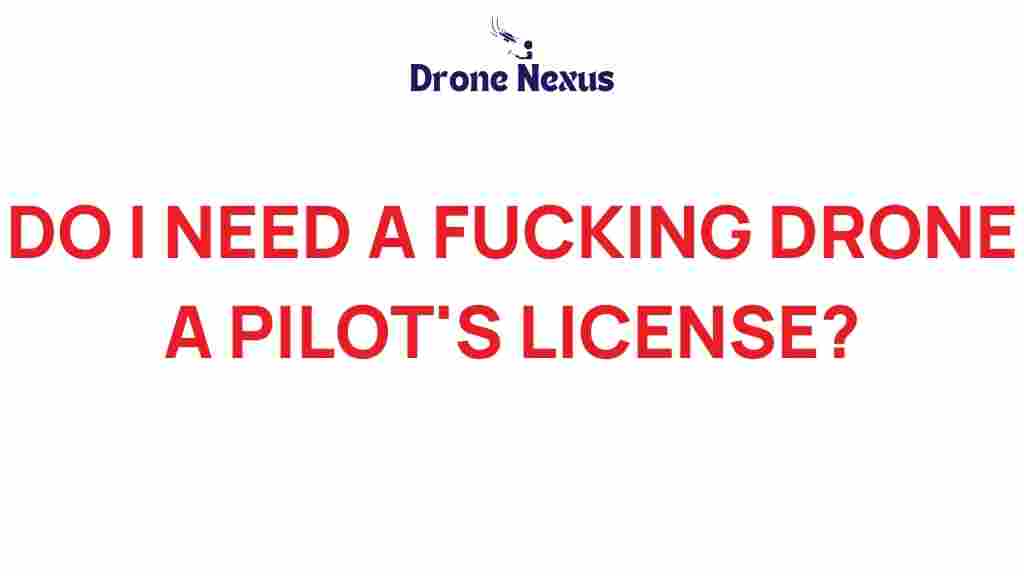Do You Really Need a Drone Pilot’s License? Unpacking the Myths
Drones have taken the world by storm, transforming industries such as photography, agriculture, and logistics. However, the question remains: Do you need a drone license to operate one? In this article, we will unpack the myths surrounding the necessity of a drone pilot’s license, providing clarity on the regulations and best practices for drone use. Whether you’re a hobbyist or a professional, understanding the rules surrounding a drone license is crucial for safe and legal operation.
Understanding Drone Regulations
Before diving into the myths, it’s essential to understand the regulations governing drone use. These regulations vary by country, but many share similar principles. In the United States, the Federal Aviation Administration (FAA) oversees drone operations, categorizing them into two main groups: hobbyists and commercial operators.
- Hobbyists: If you’re flying your drone for fun and not for commercial purposes, you are generally required to follow specific guidelines but might not need a formal drone license.
- Commercial Operators: If you plan to use your drone for business, you will likely need to obtain a drone license known as the Part 107 certification in the U.S.
The Myths Surrounding Drone Licenses
Now that we have a basic understanding of drone regulations, let’s debunk some common myths regarding the need for a drone license.
Myth 1: You Need a License for All Types of Drone Use
One of the most prevalent misconceptions is that every drone operator must have a drone license, regardless of their intended use. In reality, the necessity for a license primarily depends on whether you are flying commercially or recreationally. Hobbyists may not need a license as long as they adhere to specific guidelines.
Myth 2: Obtaining a Drone License is Complicated and Time-Consuming
While it’s true that obtaining a drone license requires some study and preparation, the process is straightforward. The FAA provides resources and study guides to help you prepare for the Part 107 certification exam. Many candidates successfully pass the test after just a few study sessions.
Myth 3: You Can Fly Drones Anywhere Without a License
Another widespread belief is that you can fly drones anywhere as long as you don’t have a license. This is false. Regardless of licensing, there are laws regulating where you can fly drones, including no-fly zones such as near airports and in certain urban areas. Always check local regulations before flying.
When Do You Need a Drone License?
Understanding when you need a drone license is crucial for compliance and safety. Here are the primary scenarios:
- Commercial Use: If you are getting paid for your aerial photography, surveying, or any other drone-related service, you must obtain a drone license.
- Hobbyist Use with Restrictions: Even if you are a hobbyist, you must follow specific FAA guidelines, such as flying below 400 feet and keeping your drone within visual line-of-sight.
How to Obtain a Drone License
If you determine that you need a drone license, follow these steps to obtain one:
- Study the Material: Familiarize yourself with the FAA’s rules and regulations. Utilize online courses, study guides, and practice tests.
- Schedule the Exam: Once you feel prepared, schedule your Part 107 exam at an FAA-approved testing center.
- Pass the Exam: The exam consists of multiple-choice questions covering various topics, including airspace classification, weather, and drone operation.
- Apply for Your Certificate: After passing the exam, you can apply for your remote pilot certificate through the FAA.
Common Troubleshooting Tips for New Drone Pilots
As you embark on your journey as a drone pilot, you may encounter some common issues. Here are a few troubleshooting tips to help you navigate challenges:
- Battery Life: Always check your drone’s battery before flying. If your battery is low, recharge it before your next flight.
- Signal Loss: If you lose signal, follow the drone’s return-to-home procedure to ensure it returns safely.
- Firmware Updates: Regularly update your drone’s firmware to avoid technical issues and improve performance.
Conclusion: The Importance of a Drone License
In summary, whether you need a drone license depends on your intended use—hobbyist or commercial. While hobbyists may not be required to obtain a license, understanding the regulations is crucial for safe and responsible flying. If you are flying commercially, obtaining a drone license is essential to operate legally and safely.
For more information on drone regulations, you can visit the FAA’s official website. If you’re looking for additional resources on drone flying, consider checking out our other articles here.
Ultimately, whether you are a hobbyist or a professional, the key to successful drone operation lies in education, preparation, and respect for local regulations. Happy flying!
This article is in the category Safety and created by DroneNexus Team
